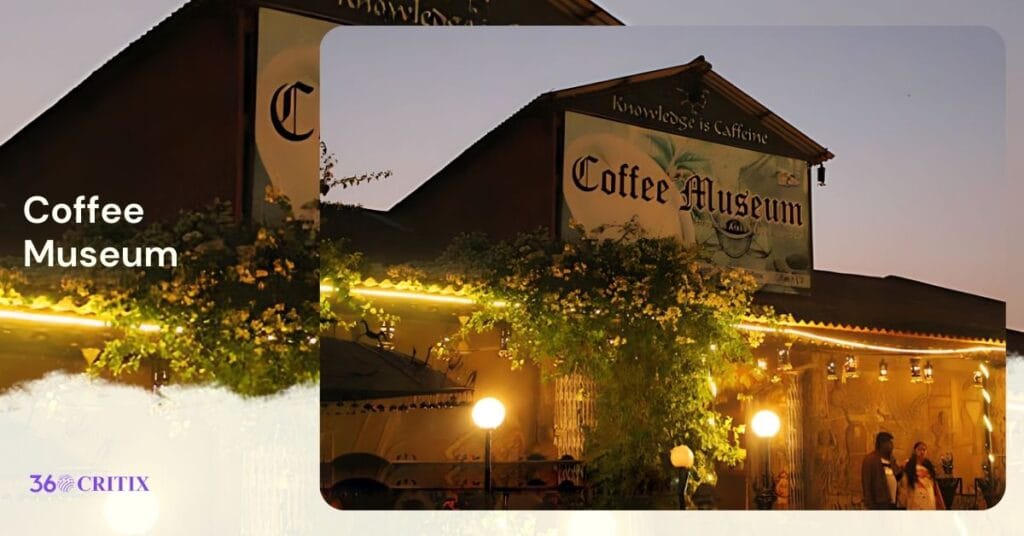One of the best representations of history and culture of coffee production in Araku Valley of Andhra Pradesh is the Coffee Museum. Located in the eastern province of Visakhapatnam in the region called Eastern Ghats, this thematic museum gives the tourists a tour on how coffee is produced from a seed to a cup introducing the world famous Araku Coffee.

Having refined my sense of exploration and hunting for offbeat places and things to do in India as a traveler, my recent visit to the Coffee Museum in Araku Valley enlighten as well as caffeined me. This historical and culturally rich museum in Indian opens in the region of the Eastern Ghats in andhra pradesh is a much more than a visit; it is a true expedition through history, culture and aroma of the coffee plantations. Whether you are into coffee and its aroma or maybe hoping to learn some basic steps on how the coffee you take every morning is made, this museum is more than rewarding.
The Coffee Museum in Araku Valley in Andhra Pradesh displays an exceptional approach towards the history and tradition related to the coffee farming in the area. Located in the Eastern Ghats, this thematic museum giving the feel of how coffee goes from seed to the cup and The important role of Araku Coffee that has found its place among the best around the globe
Historical Context
Coffee farming in Araku Valley has its beginning during the British rule in the later part of the nineteenth century. But development only started in the 1950 s with Prakash Rao starting a catering service which has grown into the present Coffee Museum. Located in the Satkosia region of the state, this museum was established in 2006 and is currently managed by the Naandi Foundation, which has helped the farmers of the region primarily the tribal populace to adopt shade grown organic coffee farming. This effort has made the valley the largest certified organic coffee producing area in the globe and it occupies an area of approximately 25000 acres.
Museum Features
One of the attractions that can be found in Traffic has the facility to depicts the ways and stages of processing coffee. , tourists are able to go through scenes which include the discovery of coffee by Kaldi, a goatherd in Ethiopia, and the progression of coffee over the years. The museum also has brightly colored paintings of the process right from the Cherries being harvested to when they are brewed, which will be appealing to the eyes of coffee lovers.
Apart from the educational programs, coffee samples which include over 60 types of coffee beverages, coffee powders are available, a range of chocolates including flavored coffees, flavors and nickers are also available here. The café in the museum provides delicious foods such as sandwiches, brownies and tarts to the museum visitors while they can take the local beers.
Visitor Experience
Sitting at approximately 114 km from Visakhapatnam, the Coffee Museum should not be missed especially when visiting Araku Valley. Entry fee is ₹ 10 and museum is available through out the week from 9 in the morning to 8 in the evening. The peasants can also offer jeep rides through the countryside, teach folk dances, and provide tourists with scope to visit places such as Borra Caves and few treks.
Also Read | Araku Tribal Museum
An Unprecedented Combination of Learning and Practical Training
The Coffee Museum which is not limited to the presentation of mere exhibits is an educational trip. Different kinds of coffee beans are displayed and the distinctions between Arabica and Robusta beans are expounded while tourists are even allowed to have a touch on some of the equipments used in the preparation of the fruit for processing and preparation.
Speaking of plantation, the facility has a small section of plantation where you can see the growth of the coffee plant and get to learn about the initial organic methods of growing coffee and how this natural resource is being farmed for sustainability in the present times. So, I was interested to know the process of growing this crop, which is done in close cooperation with the nature, thus making the environment friendly while processing quality beans.
Coffee Tasting: An Exploration for Your Palate
It wouldn’t’ be complete fun to visit the Coffee Museum without taking some time for a tasting session. Currently, the museum has various hot and aromatic freshly brewed coffee that its visitors can be served to experience taste of Araku coffee. Araku has a mild acidic character which is showcased perfectly by its rich aroma and well-balanced body and the coffee served onsite where the estates rush feel like a whole new experience. Coffee flavor is said to have an earthy flavor that accompanied by a chocolate and spice note- a clear indication of the terroir.
Most of all, I liked the chance to experiment with the kind of the brewing that highlights the taste of the coffee. Even if it is the type of coffee ranging from strong espressos shots to a cup of filter coffee, the variation is an addition.
| Category | Details |
|---|---|
| Entry Fee | ₹20 for adults, ₹10 for children |
| Timings | 10:00 AM to 5:00 PM (Closed on Sundays) |
| Nearby Attractions | Madikeri Fort, Raja’s Seat, Abbey Falls |
| What to Wear | Comfortable clothing and walking shoes |
| Best Time to Visit | October to March |
How to reach
Here’s how to go to the Araku Valley Coffee Museum:
- By Air: Visakhapatnam Airport, 110 km away, is the closest airport. You can take a bus or hire a cab to get to Araku Valley from there.
- By Train: Visakhapatnam and Araku Railway Station are well connected. From Visakhapatnam, you can travel the picturesque train route, which is very well-liked by travellers.
- By Road: Araku Valley can be reached from Visakhapatnam by regular buses and taxis. The Eastern Ghats are well viewed throughout the route.
You may get to the Coffee Museum in Araku via local transportation alternatives like auto-rickshaws and taxis.











